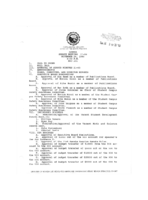Search the Special Collections and Archives Portal
Search Results
Jonathan S. Sparer, FAIA oral history interview
Identifier
Abstract
Oral history interview with Jonathan S. "Jon" Sparer, FAIA conducted by Stefani Evans and Claytee D. White on August 29, 2016 for the Building Las Vegas Oral History Project. Sparer discusses his involvement in the Jewish, and LGBTQ+ communites, and his career as an architect in Las Vegas, Nevada. He also talks about working on projects that included The Mirage Hotel and Casino, the Congregation Ner Tamid, and The Center (The Gay and Lesbian Community Center of Southern Nevada).
Archival Collection
Edwin "Tony" Wuehle oral history interview
Identifier
Abstract
Oral history interview with Edwin "Tony" Wuehle conducted by David Schwartz on December 21, 2006 for the Boyer Early Las Vegas Oral History Project. In this interview, Wuehle discusses his early life in Hettinger, North Dakota and his career as an educator. He recalls his first experiences playing poker, participating in home poker games while living in Michigan’s Upper Peninsula, and using a pseudonym as a player. Wuehle then talks about writing a book, founding the Gamblers Book Club Press in Las Vegas, Nevada, and writing for religious publications. Later, Wuehle explains the tension between participating in religion and playing poker. He describes Las Vegas poker rooms during the 1960s and 1970s and shares his thoughts on online poker. Lastly, Wuehle discusses why casinos use prop players and his efforts to organize a poker tournament to raise funds for Bay de Noc Community College in Michigan.
Archival Collection
Las Vegas Jazz Society Records
Identifier
Abstract
The Las Vegas Jazz Society Records (approximately 1975-2003) are comprised of organizational records including meeting agendas, minutes, and membership statistics of the Las Vegas Jazz Society (LVJS). Included in the collection are issues of the LVJS's newsletter Jazz Notes, promotional materials, blank membership applications, correspondence, information on other regional jazz societies, and photographic prints depicting various events and festivals. A portion of this collection documents LVJS's involvement in saving the KUNV 91.5 FM radio station.
Archival Collection
Hal Rothman Faculty Papers
Identifier
Abstract
The Hal Rothman Faculty Papers (approximately 1930-2006) are comprised primarily of research, teaching, and professional papers of Hal Rothman, professor of history at the University of Nevada, Las Vegas (UNLV). The papers include Rothman's research notes, manuscript drafts, conference articles, lecture notes, audiovisual material for his book
Archival Collection
Carolyn Freeman oral history interview
Identifier
Abstract
Oral history interview with Carolyn Freeman conducted on January 30, 2006 for the Boyer Early Las Vegas Oral History Project. Freeman begins by discussing her upbringing, her father, who was the president of the Japanese American Citizens League, and her early interest in dancing. She also details her experiences as a Japanese American during World War II and being relocated by the federal government. Freeman then describes how she began her career as a dancer after getting a role in a Broadway play in New York City, New York, and her later experiences dancing in productions in Reno, Nevada and San Francisco, California during the 1950s and 1960s. Lastly, Freeman discusses the differences between living in Las Vegas, Nevada compared to California and being offered the chance to dance in a Frank Sinatra show by himself and Sammy Davis Jr.
Archival Collection

Transcript of interview with Ruth Gust by Beth Ann Bonenfant, March 10, 1981
Date
Archival Collection
Description
On March 10, 1981, Rebecca (Beth) Bonenfant interviewed Ruth Gust (born 1905 in Mokane, Missouri) about her life in Nevada. Gust first talks about her original move to Las Vegas in 1947 and some of the first businesses that existed at the time. In this brief interview, she also talks about the first casinos, the culinary union, her employment as a server, and Mt. Charleston.
Text

University of Nevada, Las Vegas (UNLV) 43rd commencement program
Date
Archival Collection
Description
Commencement program from University of Nevada, Las Vegas Commencement Programs and Graduation Lists (UA-00115).
Text

Arturo Ochoa interview, April 9, 2019: transcript
Date
Archival Collection
Description
On the corner of Eastern and Stewart, inside the East Las Vegas Community Center, lies an oasis of creativity and art. The halls ring with the sound of harmonious music coming from the meeting rooms, where children move violin bows up and down in a synchronized motion. They stare with concentration at the music sheets in front of them. They gracefully play together and fill the empty halls with classical music. For most of them, they are the first in their family to learn how to play an instrument. Like many in their neighborhood, they are also first-generation Americans. The students are rehearsing for their recital with the Las Vegas Philharmonic at the Smith Center in a few weeks. In the back of the room there is a man gleaming with pride and joy. The Foundation to Assist Young Musicians (FAYM) provides the rehearsal space, violins, and music lessons at the community center and allows these children to flourish despite their economic, social, or racial background through, “Building
Text

Interview with Helen Marguerite (Troester) Draper, June 24, 2004
Date
Archival Collection
Description
Text

Meeting minutes for Consolidated Student Senate University of Nevada, Las Vegas, November 29, 1990
Date
Archival Collection
Description
Text
